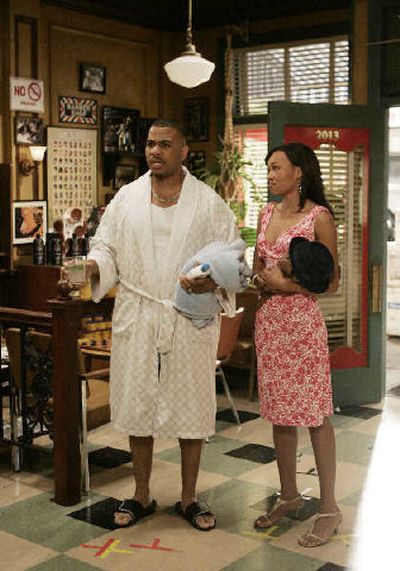‘Barbershop’ series debuts on Showtime

Smoke spirals from a smoldering barber’s chair.
Spewing swear words, beautician Terri complains about her malfunctioning hot comb.
Another woman, Jen, whose husband runs the joint, waves a puppet head on a stick, while an indignant man holds a plate of chicken bones and two younger men tussle and scuffle.
An angry ex-con named Romadal utters threatening profanities and is later arrested by police.
The shop’s proprietor, Calvin, in bathrobe and flip-flops and holding a mixed drink, exclaims: “You’re all nuts.”
Just another chaotic scene from “Barbershop,” Showtime’s new comedy series adapted from the hit movies “Barbershop” and “Barbershop 2: Back in Business” about an opinionated and volatile bunch of folks at a Chicago barbershop.
The original movie generated headlines when the Revs. Jesse Jackson and Al Sharpton criticized it for comments about Martin Luther King Jr. and Rosa Parks.
But audiences flocked to the film anyway because of the humorous way it expressed disparate views about urban life.
The Showtime series’ executive producer, writer and director is John Ridley, whose credits include the screenplay of the movie “Three Kings” and the TV series “Platinum.”
A commentator on National Public Radio, Ridley’s not scared of controversy. There’s nothing stirred up in the original movie that he plans to avoid, and, of course, a cable series is less restricted in its content than a PG-13 film.
“The first ‘Barbershop’ kicked the door open and said, ‘Look, we’re going to talk about whatever we want to talk about,’ ” Ridley says. “I think the responsible thing we have to do, even though it’s a comedy, even though we have a lot of fun, and even though in someway we are a little more absurdist than the movies, is to recognize that just to bring up a topic for the sake of bringing it up is not enough.”
But he’s also not interested in creating a polemic. Funny is what counts most, and he cites Mel Brooks’ “Blazing Saddles” as his model.
“That was a movie that was really wild and really funny, but you remember Cleavon Little is a black sheriff in the Old West. It was about race and politics, but it was one hell of a good time,” says Ridley.
The new series’ eight-member principal cast is an eclectic mix of veteran character actors and newcomers, most of whom did not appear in the “Barbershop” movies. But they all play characters from the films, plus one new role created by Ridley – Romadal, played by Dan White.
Omar Gooding, brother of Academy Award winner Cuba Gooding Jr., plays Calvin, who was portrayed in the movies by Ice Cube (an executive producer on the series).
“I felt I could bring a lot more comedy to the role … I get to set the pace. I’m the glue and I have no problem being the glue,” says Gooding, whose character also narrates the series.
Jen, a minor character in the movies, is more fleshed out in the TV version as an independent wife and mother with her own business.
Terri, originally played by rapper/actress Eve, is portrayed by Toni Trucks, an actress with stage credentials making her TV debut.
Trucks had not seen the original movie when she first auditioned, “which maybe worked to my benefit,” she says. “We were really encouraged to reinvent all the characters, which is so fun and freeing.”
Gbenga Akinnagbe plays Yinka (originally called Dinka), a Nigerian immigrant, and Leslie Elliard plays Jimmy, a local politician. Both actors have extensive stage experience and were seen in HBO’s crime drama “The Wire.”
Veteran character actor Barry Shabaka Henley plays Eddie, the inflexible, old-school barber who was portrayed by Cedric the Entertainer in the movie.
Henley hasn’t seen either movie, but relies on his own memories of hanging out at a family friend’s barbershop as a kid, listening to “spirited debates” during the Kennedy-Nixon presidential race.
“You saw every strata of the African American community,” he says, “the doctor, the janitor, the guy who just got out of prison. So you got a sort of panorama.”